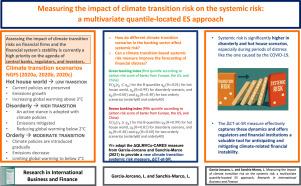测量气候过渡风险对系统风险的影响:一种多变量分位数定位ES方法
IF 6.9
2区 经济学
Q1 BUSINESS, FINANCE
Research in International Business and Finance
Pub Date : 2025-08-01
DOI:10.1016/j.ribaf.2025.103127
引用次数: 0
摘要
我们在三种气候转型情景下(温室世界、无序转型和有序转型)引入了气候系统风险度量,即系统性风险下的三角洲气候转型(ΔCT-at-SR)。我们基于欧洲、美国和中国银行的碳风险评分(CRS)构建了绿色银行指数和棕色银行指数。在估计和预测分析中,我们发现在困境时期,特别是在COVID-19时期,无序情景的系统性风险最高。我们的系统性风险指标可以预测金融体系中与气候相关的风险。本文章由计算机程序翻译,如有差异,请以英文原文为准。

Measuring the impact of climate transition risk on the systemic risk: A multivariate quantile-located ES approach
We introduce a climate systemic risk measure, Delta Climate Transition at Systemic Risk (CT-at-SR), under three climate transition scenarios that indicate different levels of vulnerability to the transition to a low-carbon economy (hot house world, disorderly, and orderly transition). We construct green and brown banking indices based on the carbon risk score (CRS) of banks from Europe, the US, and China. In the estimation and forecasting analysis, we find the highest systemic risk in the disorderly scenario during distress periods, especially in the period of COVID-19. Our systemic risk measure could forecast climate-related risk in the financial system.
求助全文
通过发布文献求助,成功后即可免费获取论文全文。
去求助
来源期刊

Research in International Business and Finance
BUSINESS, FINANCE-
CiteScore
11.20
自引率
9.20%
发文量
240
期刊介绍:
Research in International Business and Finance (RIBAF) seeks to consolidate its position as a premier scholarly vehicle of academic finance. The Journal publishes high quality, insightful, well-written papers that explore current and new issues in international finance. Papers that foster dialogue, innovation, and intellectual risk-taking in financial studies; as well as shed light on the interaction between finance and broader societal concerns are particularly appreciated. The Journal welcomes submissions that seek to expand the boundaries of academic finance and otherwise challenge the discipline. Papers studying finance using a variety of methodologies; as well as interdisciplinary studies will be considered for publication. Papers that examine topical issues using extensive international data sets are welcome. Single-country studies can also be considered for publication provided that they develop novel methodological and theoretical approaches or fall within the Journal''s priority themes. It is especially important that single-country studies communicate to the reader why the particular chosen country is especially relevant to the issue being investigated. [...] The scope of topics that are most interesting to RIBAF readers include the following: -Financial markets and institutions -Financial practices and sustainability -The impact of national culture on finance -The impact of formal and informal institutions on finance -Privatizations, public financing, and nonprofit issues in finance -Interdisciplinary financial studies -Finance and international development -International financial crises and regulation -Financialization studies -International financial integration and architecture -Behavioral aspects in finance -Consumer finance -Methodologies and conceptualization issues related to finance
 求助内容:
求助内容: 应助结果提醒方式:
应助结果提醒方式:


